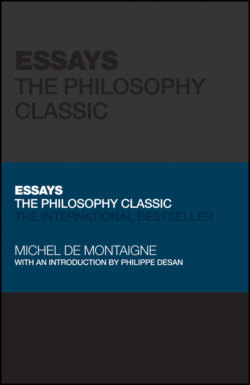Читать книгу Essays - Michel de Montaigne - Страница 19
THE NECESSITY OF DOUBT
ОглавлениеResistant to models and systems, Montaigne takes pleasure in the fortuitous and contradictory aspect of the multitude of things encountered. He attempts to seize them in the fleeting moment of personal judgment that must be understood within its historical milieu. Judgment is never final, because it expresses a point in time and space, of this man in this world.
Montaigne's biography is filled with these “doubt moments” which, through their repetition, create in the author a skeptical reflex which in time becomes a natural reaction. Yet the reflex has the function of helping him rediscover a moral stability in a time of upheaval – a time when as he famously puts it, “the world eternally turns round” (III, 2).
The various political and religious crises that punctuated the second half of the sixteenth century called into question a morality that was now discredited and obsolete. In short, utility replaced honesty. Montaigne offers an excellent analysis of this moral crisis in “On Profit and Honesty” (III, 1). In this chapter written after 1585, he shows how bourgeois values gradually replaced noble values such as honor, frankness, loyalty, good faith, and moral transparency. Past behaviors no longer exemplified moral models, as personal profit was now established as the only rule of behavior. Montaigne is the witness of this ideological transformation – anchored in historical and economic developments – which sees honor and truth replaced by utility, success, and personal experience. It is perhaps a weaker path “which is a means much more weak and cheap; but truth is so great a thing that we ought not to disdain any mediation that will guide us to it” (III, 13).
The reappraisal of the notion of truth is obviously influenced by Montaigne's personal experiences. They leave him with a feeling of a permanent relativism which no longer allows him to judge anything in a lasting way. In a time when the vicissitudes of religious conflict seemed to govern everything, it makes sense to doubt what education has transmitted to you. In place of eternal values, a new truth has emerged: the truth of those who came out victorious.
Rather than commenting on the political, religious, and social situation of his country, Montaigne takes refuge in personal introspection. It replaces the rhetorical demonstrations of which he was always suspect. Morality is shaped by the military actions of clashing religious forces. Doubt then becomes a natural reflex at a time when all humanist benchmarks are systematically destabilized. The truths of yesterday crumble and the sandy soil upon which philosophy was built suddenly opens. The end of the Renaissance is a yawning abyss that engulfs past practices and knowledge, leaving only the necessity of doubt.
